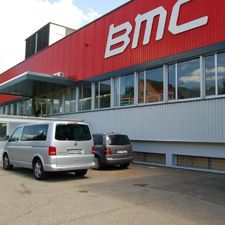GRENCHEN, Switzerland (BRAIN)—BMC opened the doors this week to its CHF 40 million ($37.5 million) fully automated factory at its headquarters in Grenchen, an industrial center in Switzerland’s Jura Valley.
Following the vision of BMC owner Andy Rihs, the factory was built over the past five years to support production of BMC’s new Impec woven carbon fiber road bike, which team riders George Hincapie and Cadel Evans debuted this week in the Tour de France.
On Monday, BMC’s marketing team ushered a small group of journalists into the once closely guarded facility, located just around the corner from BMC’s main offices.
After watching a marketing video on Impec in a dark showroom, the tour began on the main factory floor.
Each Impec frame undergoes a precise seven-step manufacturing process, nearly all of which is guided by the swiveling arm of a large, orange robot.
“Every bike is exactly the same. No human error is possible,” said Frank Schreiner, head of marketing for BMC.
The process starts with a 128-spindle wheel called Stargate that, in six minutes, braids raw carbon fiber into a tube based on individual specifications programmed into the computer.
The tube then moves down the assembly line to the resin transfer molding room where another robot injects the tube with resin then delivers it into the press where it’s cured for 15 to 18 minutes. The amount of resin, curing temperature and time is programmed based on the tube’s specification, eliminating the need for sanding.
Tubes are then trimmed to the exact size and geometry with a 6-axle robot that places it under a diamond saw. In the next room, tubes are individually painted by a robot that simulates a human hand, applying paint at a 45-degree angle, before tubes move through the automated pad printing station for decals.
Finally, tubes are assembled with composite material shells made by a Swiss third-party. The only time a human hand touches the tubes is during this last step when a worker manually places tubes in the shells.
Frames are tested for impact and fatigue in BMC’s in-house lab.
Capacity at the factory is about 20,000 frames per year. BMC expects to make about 2,500 Impec frames in the project’s first year. One hundred key dealers will be selected to carry the frame, including about 25 in the U.S.
—Nicole Formosa
nformosa@bicycleretailer.com


